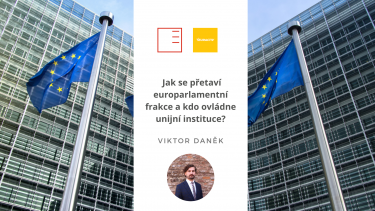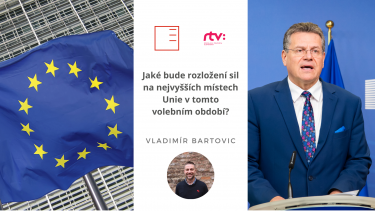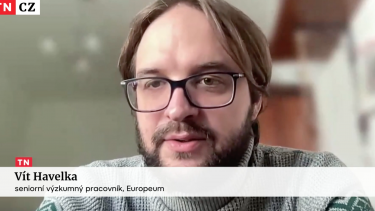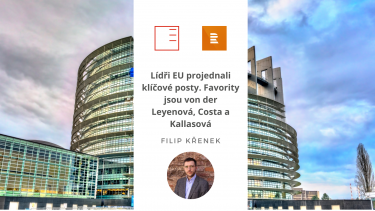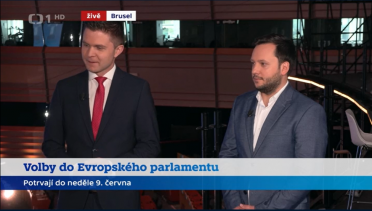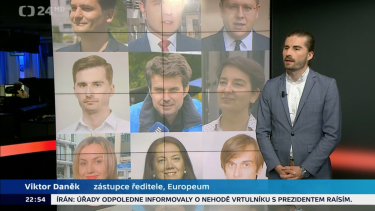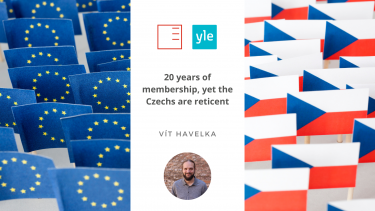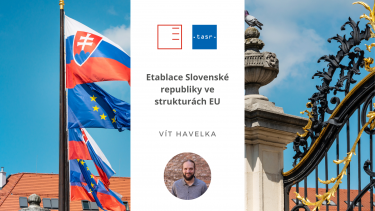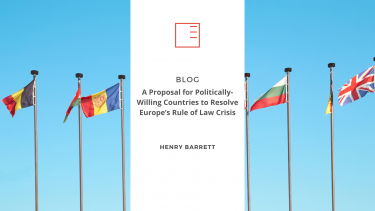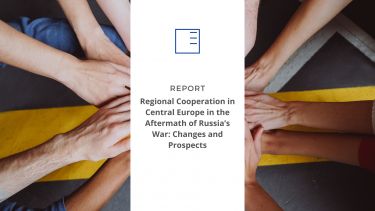Euractiv.cz | Post-election reshuffles. How will the European Parliament factions transform and who will dominate the EU institutions?
The key issues for the new term in the EU do not end with the European elections. Forces in European Parliament continue to shift depending on factions, while leaders select institutional leadership. How will the elections and the composition of the European Parliament influence the future functioning of the EU? And who will lead it? Viktor Daněk, Deputy Director of EUROPEUM Institute, answered these questions for Euractiv.cz.
Zjistit víceRTVS | What will be the balance of power at the top positions of the Union?
After the European Parliament elections, government leaders of the EU member states must agree on the leadership of the European institutions. The agreement must be finalized by the end of the month. Vladimír Bartovic, President of EUROPEUM Institute, answered questions about the negotiations.
Zjistit víceTV Nova | Personnel Changes in European Institutions
After the European elections, institutions in Brussels are facing personnel changes. Who is likely to assume the most important positions, namely the the head of the European Council, the European Commission, and the European Parliament? Vít Havelka, senior researcher at EUROPEUM Institute, commented on this in the main evening broadcast on TV Nova.
Zjistit více
ČRo Plus | EU leaders discuss key positions. The favorites are von der Leyen, Costa, and Kallas
On Monday 17 June, the leaders of the European Union Member States headed to Brussels for their first joint meeting after the European Parliament elections. They discussed the distribution of key posts at the head of the EU institutions - the President of the European Commission, the European Council and the European Parliament. Filip Křenek, project coordinator and analyst at EUROPEUM Institute, commented on the likely distribution of forces for ČRo Plus.
Zjistit více
ČT24 | The European Union is in a state of unity, despite differences among some member countries
The European Parliament elections held from June 6th till 9th not only introduced a new lineup of MEPs but also brought significant changes in the distribution of seats among various countries. The European Union is gearing up for new challenges with its new leadership, and Hungary will assume the presidency in July. How will the European institutions transform, and what priorities will dominate over the next five years? Žiga Faktor, Deputy Director and Head of the Brussels Office of EUROPEUM Institute, commented for Czech Television.
Zjistit více
Newsroom ČT24 | How journalists work in Brussels
What is the work of journalists in Brussels like? How difficult is it to find respondents for interviews? And is a lot of media in the Czech Republic interested in the EU? Viktor Daněk, Deputy Director of Institute EUROPEUM, talked about his experiences as a journalist in Brussels on the programme Newsroom ČT24.
Zjistit víceYle | 20 years of membership, yet the Czechs are reticent
For 20 years, the Czechs have benefited billions of euros from EU membership, yet they are more reticent about the Union than others. Where does this opposition come from? How do the Czechs see the EU and their role in it? Comments Vít Havelka, Senior Research Fellow at EUROPEUM Institute for the Finnish public radio and TV.
Zjistit více
TASR | Establishment of the Slovak Republic in the EU structures
Twenty years ago, the European Union underwent its biggest enlargement with the addition of ten Central and Eastern European countries. According to Vít Havelka, Senior Research Fellow at EUROPEUM Institute, this is enough time for all accession countries to learn how to navigate the EU institutions and its decision-making process.
Zjistit více
BLOG | A Proposal for Politically-Willing Countries to Resolve Europe’s Rule of Law Crisis
Given the lack of adequate EU responses over rule of law violations, politically-willing European states ought to consider a novel accountability mechanism. It is high time for committed European states to take innovative and decisive action on more than a decade of democratic backsliding sweeping the region and the world. Should European Union Member States concerned about rule of law violations seek a solution outside the EU institutions? Our researcher Henry Barrett, a Fulbright-Schuman Grantee, writes about this topic in his blog.
Zjistit víceReport | Regional Cooperation in Central Europe in the Aftermath of Russia’s War: Changes and Prospects
On April 18th, EUROPEUM’s Brussels Office in partnership with PISM Brussels Office under the Think Visegrad platform hosted a discussion titled “Regional Cooperation in Central Europe in the Aftermath of Russia’s War: Changes and Prospects”. This event was attended by 15 experts from think tanks and representatives of EU institutions.
Zjistit víceStaroměstské náměstí 4/1
Praha 1 - Staré Město
110 00
tel.: +420 212 246 552
email: europeum@europeum.org
https://www.europeum.org
